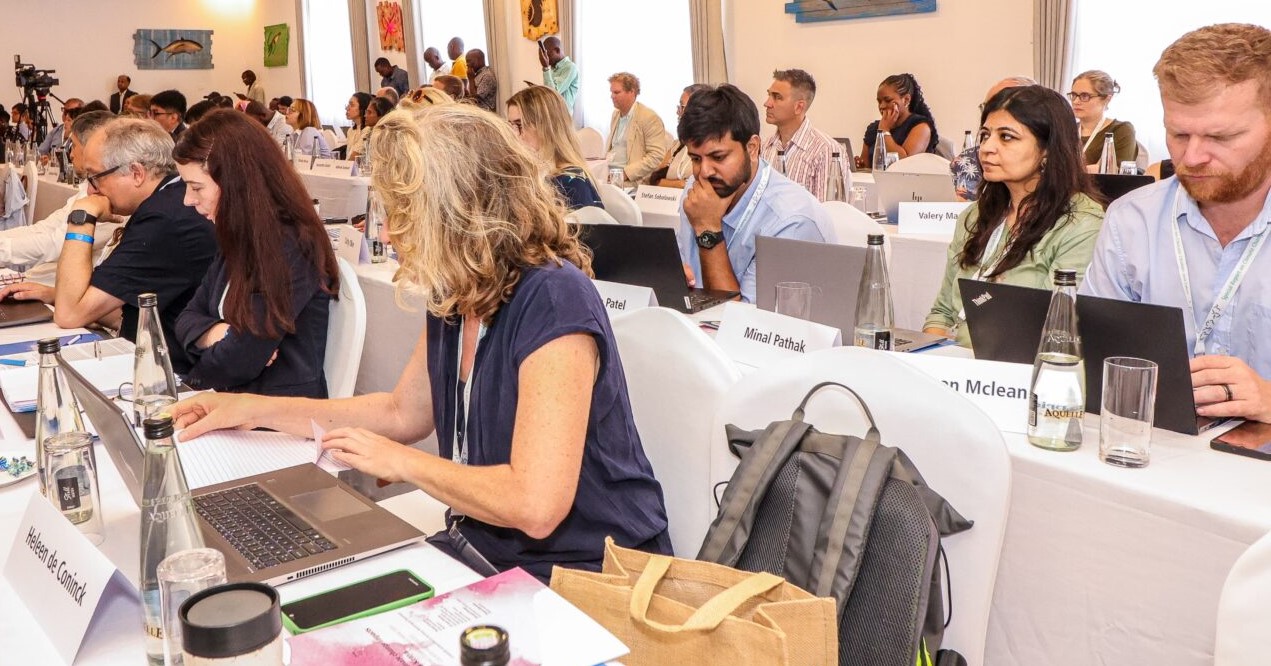
“Rising seas threaten roads, homes, and livelihoods in Mombasa — and experts warn the window for action is closing fast”
As the sun rises over Kenya’s coastline, it brings more than warmth. For thousands living near the sea, it brings fear — fear that the ground beneath their homes may soon be swallowed by the waves.
That urgency echoed powerfully at the Intergovernmental Panel on Climate Change (IPCC) meeting in Mombasa, where scientists and policymakers warned that Africa’s coastal cities stand on the frontline of the climate crisis.
“Our Roads Could Be Part of the Ocean”
Dr. Cromwell Lukorito, Vice Chair of IPCC Working Group II, issued a stark warning: sea-level rise is no longer a distant threat. “In Mombasa, especially along the North Coast, we are seeing widespread displacement where water is taking over settlements,” he said.
[Dr Cromwel Lukorito, Vice Chair of IPCC Working Group II, addressing the media at the IPCC meeting. Photo/Ahmed Omar/Sept’ 29, 2025].
With infrastructure at risk, including the vital Mombasa–Malindi highway, Lukorito cautioned: “If we don’t stem it, very likely our Mombasa–Malindi road could be part of the ocean.”
The consequences extend beyond roads. Fisheries, mangroves, and tourism — lifelines for coastal communities — are eroding. “The mangroves, breeding habitats for fish, are steadily being pushed inland. But how far can they adapt when farmland and settlements stand in the way?” Lukorito asked.
Science Must Speak Africa’s Reality
The choice of Mombasa as host city was deliberate. Africa is the world’s most climate-vulnerable continent, yet its voice in shaping global policy often goes unheard. “Nobody can write for me and about me,” Lukorito declared. “I’m better placed to put my case.”
Dr. Philip Osano of CIFOR-ICRAF underscored the need to ground science in lived experience. “It’s not just about science in meeting rooms. It’s about science being felt, lived, and responded to on the ground,” he said, calling for urgent investment in climate-resilient infrastructure.
Cities at the Heart of the Crisis
IPCC Co-Chair Professor Winston Chow stressed that cities are both engines of the crisis and victims of it. They produce more than 70% of global emissions, house over half the world’s population, and generate 80% of global GDP — yet they are increasingly hotspots for vulnerability.
[Professor Winston Chow (left), Co-Chair, the IPCC Working Group II, with the Principal Secretary Ministry of Environment, Climate Change, and Forestry Dr Eng. Festus Ng’eno at the IPCC Meeting. Photo/Ahmed Omar/Sept’ 29, 2025].
“This is about people who live in cities, their infrastructure, and their survival,” Chow said. “Ports, roads, heritage, and even tourism are at risk. This decade is critical for climate action.”
Mombasa Already Feeling the Heat
For local leaders, the crisis is not theoretical. “Last year we had a scare,” said Emily Achieng Okello, Mombasa’s CECM for Water and Climate Change Resilience, citing cyclones and unprecedented flooding. “Mombasa is no longer merely preparing for a distant future. We are reacting to climate shocks already at our doorstep.”
The county has launched a Climate Change Action Plan (2023–2050) to safeguard infrastructure and communities, but Okello admitted that conditions are evolving too quickly. Rising urban heat is now hitting the city’s most vulnerable — children, the elderly, and women — hardest.
Kenya’s National Response
Dr. Festus Ng’eno, Principal Secretary for Environment and Climate Change, described hosting over 100 global experts in Mombasa as a milestone for Kenya. “The IPCC gives us the scientific evidence we need to inform national and local policies,” he said.
Kenya is rolling out measures including urban greening programs, a 15-billion tree-growing campaign, and solid waste reforms. Yet in coastal cities like Mombasa, challenges of sea-level rise, land degradation, and overstretched services persist.
A Call for Justice and Urgency
The voices from Mombasa carried a common message: Africa cannot afford delayed action. Coastal cities are collapsing under pressures they did little to create, yet they hold the key to regional economies and global trade.
[Dr Philip Osano, Chief Operating Officer at the Center for International Forestry Research and World Agroforestry (CIFOR-ICRAF). Photo/Ahmed Omar/Sept’ 29, 2025].
“We must harness Africa’s think tanks and scientific voices,” Lukorito urged. Osano added: “We need cities to invest in climate-resilient infrastructure now. Without it, the cost will be unbearable.”
For millions across Africa’s coasts, climate change is no longer tomorrow’s threat. It is today’s reality — one that demands urgent global responsibility, stronger regional action, and unwavering local resilience.